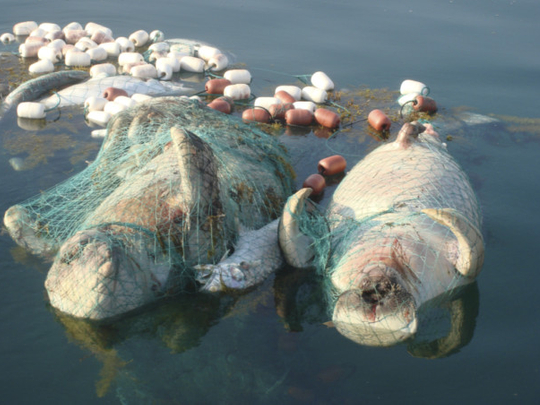
Abu Dhabi: Cases of dugongs — an endangered species — drowning after being trapped in abandoned, lost or illegal fishing nets have surged in the last five years, the Environment Agency Abu Dhabi (EAD), said on Wednesday.
Studies conducted by EAD reveal 153 incidents of dugong deaths in the 2000-14 period. The main cause of mortality in this period was drowning in abandoned, lost and/or illegal fishing nets (72.5 per cent) followed by vessel strikes (15.7 per cent). However, in the last five years (2010-2014), the cause of death due to drowning has increased to 85 per cent.
The UAE hosts the world’s second-highest dugong population after Australia. Over 2,800 dugongs are currently resident in UAE waters. Many of these can be found at the Marawah Protected Reserve off the coast of Abu Dhabi.
Dugongs, their habitats and migratory routes in the UAE are protected under Federal Laws 23 and 24 of 1999. The UAE is also a signatory to the UN Convention on Migratory Species.
Calling upon residents to support dugong conservation efforts, Razan Al Mubarak, secretary-general of EAD, said: “These figures reaffirm the vulnerability of these majestic animals to human threats such as being caught in discarded fishing nets.”
Dugongs are a herbivorous marine mammal dependent on seagrass for survival.
“It is important that we protect our dugong population because the species has a very long reproductive cycle of three to five years. If a dugong is killed, it takes a long while for the population to replace it,” Shaikha Al Dhaheri, executive director of biodiversity at the EAD, told Gulf News.
Dugong mortality was noted to rise during the winter months from November to March, which coincides with a greater congregation of dugongs and an increase in the level of fishing activity.
The dugong deaths mostly occur when dugongs are caught in fishing nets, known as ‘hiyali’, which are used by fishermen to catch king fish. These nets are deployed in shallow waters with a depth of eight to 10 metres, which feature the extensive seagrass meadows that dugongs naturally inhabit.
Shaikha said: “There is a Dh4,000 fine for illegal fishing nets that are found, but we also urge community members to report any dugongs they spot caught in discarded fishing nets,” she added.
The EAD statement added that informal interviews have revealed that the majority of fishermen are aware of laws prohibiting the use of illegal nets, as well as the protected status of the dugong in the UAE.
Residents have been urged to report dugong threats and mortalities, as well as risks to other species, through the Abu Dhabi Government Contact Centre 800 555.
Since 1999, EAD, Total, and Total ABK have collaborated in conducting detailed studies on the local dugong population. These studies have provided EAD with critical, timely data that helps the agency better understand the behaviour of and threats to the dugong population.
EAD called on the community to report any dead dugong or any other species caught in discarded fishing nets through the Abu Dhabi Government Contact Centre.












